“Making Your Philosophical Mark: Presenting and Publishing as a Philosophy Major” By Justin Felip “Dads” D. Daduya
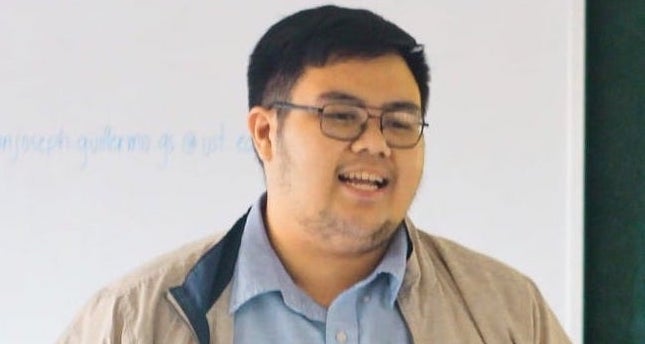
Philosophy students in the University of the Philippines aren’t just asked to do well in the lively debates in class; we are asked to engage with the philosophical discourse beyond our classrooms –debates which have raged for millenia– through conferences, publications, and other scholarly work. As someone who has grown to love these academic pursuits over the last few years, I’m grateful that these opportunities to present and publish have allowed me to not just scratch my philosophical itch, but to make meaningful contributions both to scholarship and issues that go beyond the academe.
Even before college, I was always excited about the idea of research – the chance not only to do interesting work, but to leave a legacy that will forever be inscribed in the conversations about the field you study. Entering the department, of course, made this a much clearer goal, knowing that I had to fill in the footstops of brilliant philosophers like Ricardo Pascual and Armando Bonificio, and even the professors that we had the privilege of learning from ourselves in their last years such as Leonardo de Castro and Earl Fronda.
Funnily enough, however, I attribute my love for philosophical research mainly not to an academic experience – although naturally, most of my works are built on things I learned from my classes. Instead, I attribute it to the consistent random conversations with my peers about seemingly mundane topics that turn out to be philosophical goldmines. My friends and I would talk about everything from analyzing the sociopolitical implications of labelling things as “Jejemon” to the epistemological underpinnings of red velvet cupcakes. I guess this is why it felt really easy to start sending in papers for conferences and for publication – I had already been philosophizing constantly, I just needed to put the words on paper. Luckily, the same people who I had so much fun jokingly applying philosophy to the most banal topics quickly turned into my best editors and my sharpest critics. While still being just as fun, our conversations started to deal with questions of whether Nozick’s rectification measures undermine his call for a minimal state, or how epistemic injustices played into covering up the war on drugs.
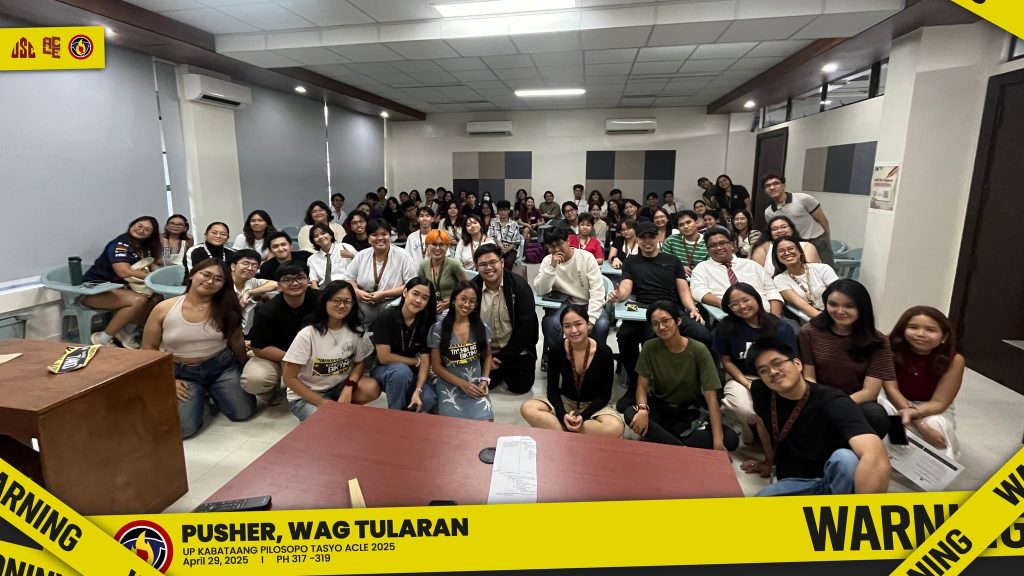
Dads is currently the Supremo (Org Head) of UP Kabataang Pilosopo Tasyo (KAPITAS).
I guess when so many of the people around you are so fun to philosophize with – as is the case here – you can’t help but keep wanting to philosophize. That’s what academic writing felt like for me initially: scratching the thousands of philosophical itches borne out of philosophical debates with my peers.
But of course, the beautiful thing about philosophical scholarship is that it doesn’t stop at just being fun; you actually have the capacity, even as an undergraduate, of moving the scholarship forward. It lets you take on people who are way out of your league, and if you’re lucky, you can manage to make some room for your own ideas.
My best example for this is something I always talk about: working on what would eventually be my first publication with Sir Fronda. I came up with the idea to write about reasonable belief in miracles not just because I was interested in the topic; I specifically wanted a paper that critiqued a paper by Sir Fronda himself, trusting that he would be fair even if he disagreed.
In true Sir Fronda fashion, he did end up disagreeing – quite vehemently, and without pulling any punches while expressing this disagreement. He seemed to point out every single one of my mistakes with glee, and explicitly said that my argument, at least in the original version of that paper, fell flat.
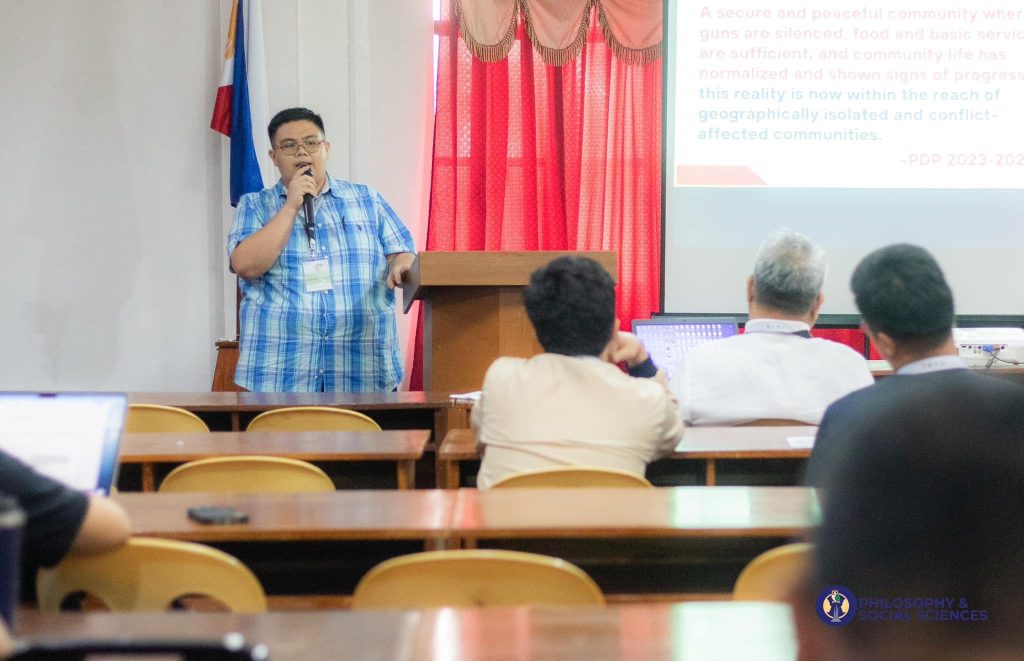
Dads presenting at the 2024 Philosophical Association of the Philippines National Conference on how Katarungan squares with peace negotiations, specifically discussing the Comprehensive Agreement on Social and Economic Reforms.
To this day, however, I go back to that moment whenever I need inspiration to write – not because I managed to convince him about my position, but because even if you could hear the sarcasm oozing out of his voice with every single comment about my mistakes, he still took the time to write out the four single-spaced pages of comments, and ended with an encouragement to actually turn the paper into a journal article. He, the very thinker I was disagreeing with, and a philosopher who was lightyears ahead of me, thought that I did indeed have something that would push the conversation forward, and that even debate that spanned from Hume to Wittgenstein and even to himself, I still had space for my own ideas.
Finally, and perhaps most importantly for me, these opportunities also allowed me to see how my philosophy could engage with questions far beyond the academe. With UP’s storied history of militant activism, I knew I had to live up to it, even in my scholarship.
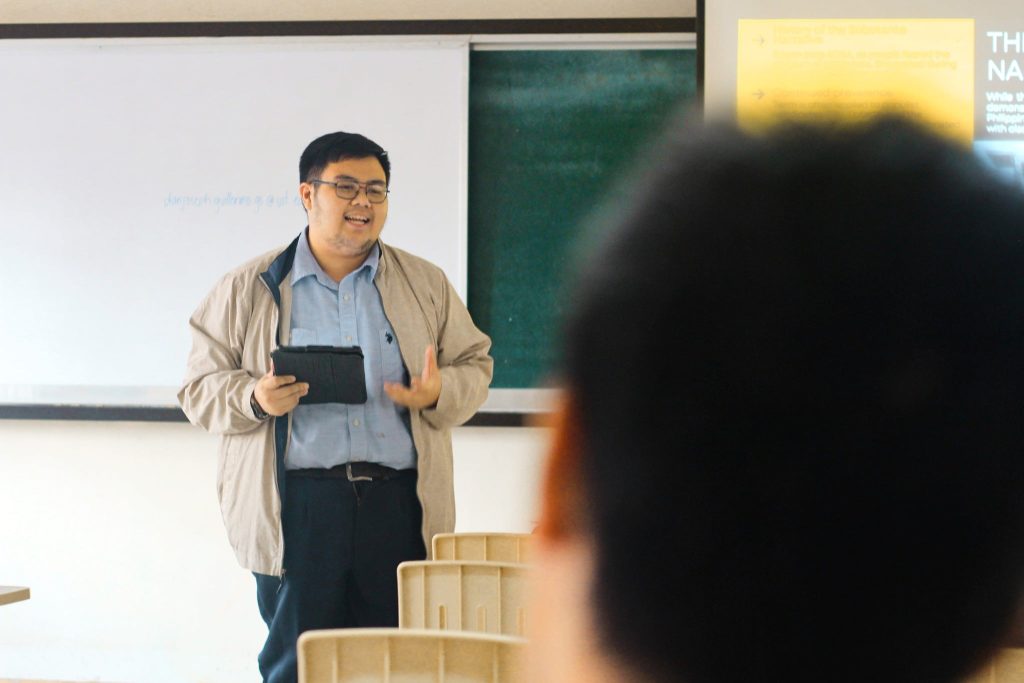
Dads presenting at the 4th Philosophy, Communication, & Culture Conference at the St. Paul Smeinary Foundation, Silang, Cavite last March 2025. In his presentation, he used historical materialism to analyze the notion of the Bobotante in the context of the liberal democratic paradigm.
Because of this, over the last year, I’ve managed to write about trustworthy artificial intelligence appraisals, ways towards anti-propaganda critical pedagogy, and the righteousness and necessity of achieving a just and lasting peace. I’ve also had the chance to develop long-term projects such as my work on the epistemic underpinnings of the resurgence of the far right, which is increasingly relevant amid the worsening Marcos-Duterte rift and the rise of far-right populists across the Globe. Our organization, UP Kabataang Pilosopo Tasyo, is even organizing a nationwide conference dedicated to Filipino philosophy in service of the Filipino people.
I guess all of this goes to show that when we write knowing that it’s meant for far more than the classroom, just as we are expected to, we do a kind of philosophy that is worthwhile: philosophy that satisfies our basic hunger for philosophical clarity, contributes to the conversations of the centuries, and goes beyond the academe to analyze and change the world. This kind of philosophy has been one of my favorite parts of college life, and as I leave my undergraduate years behind, I can’t wait for many more young philosophers in the department to feel how I feel today.
ABOUT THE AUTHOR
Justin Daduya is a fourth year philosophy major from the University of the Philippines Diliman. He has published his work Miraculosity claims as inferences to the best explanation: why reasoning about miracles must be abductive in the International Journal for Philosophy of Religion (see below).
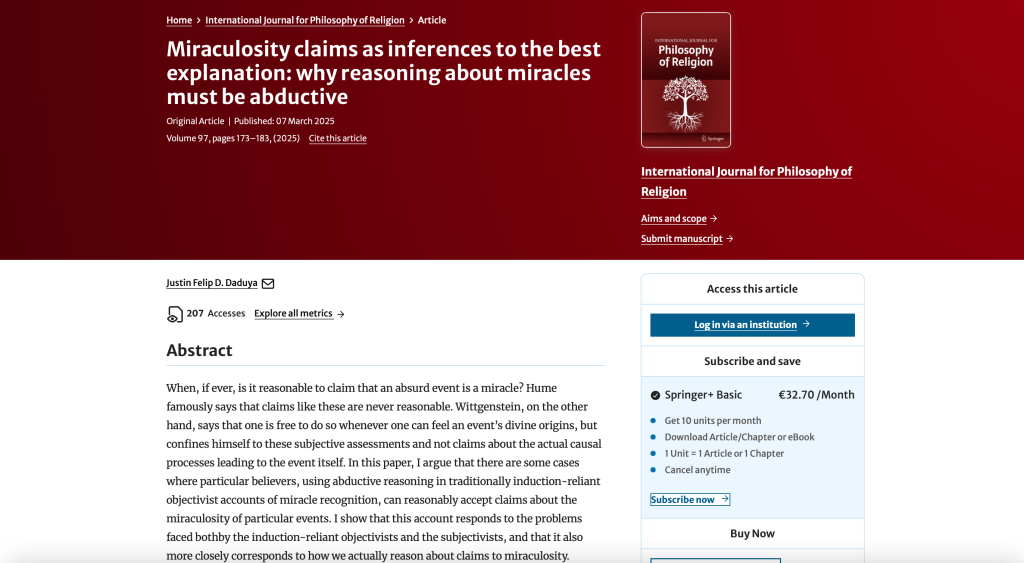
Dads’ first international publication may be accessed at https://link.springer.com/article/10.1007/s11153-025-09952-6.
He has also presented in the following conferences:
- A Social Foundationalist Response to the Epistemic Regress Problem – The Emmanuel Q. Fernando Philosophy Undergraduate Conference, 2025
- Epistemic Commodification and the Crisis of Expert Trust: Towards a Social Epistemology of Late Stage Capitalism – The 10th De La Salle University Undergraduate Philosophy Conference, 2025
- The ‘Bobotante’ Construct and Political Despair in the Age of Disinformation: A Historical Materialist Critique – Saint Paul Seminary Formation 4th Philosophy, Communication and Culture Conference, 2025
- Academic Dependency and the Myth of Merit: A Case for Academic Reparations – Resisting Intellectual Imperialism and Epistemic Violence: Towards Autonomous Knowledge Production, 2024
- Explaining Miracles: An Epistemological Account of Recognizing Miraculosity as Inferences to the Best Explanation – John Paul II International Conference God and the World: Dialogues on Culture, Religion, and Science, 2024
- Historico-Materialist Decolonization and the Methodological Woes of Filipino Philosophy – Resisting Intellectual Imperialism and Epistemic Violence: Towards Autonomous Knowledge Production, 2024
- Injustice in Holdings, Imperialist Plunder, and Inconsistencies in Nozick’s Justification of the Minimal State – Durungawan (CSSP Undergraduate Conference), 2024
- Kapayapaan Batay Sa Katarungan, Hindi Sa Karahasan: Ang Pilipinong Konsepto Ng Katarungan Sa Comprehensive Agreement on Social and Economic Reforms – Philosophical Association of the Philippines (PAP) Annual Conference, 2024
- Off With Their Heads!: A Thomistic Response to Foucault’s Objections to the People’s Court – Aquinas and Foucault: At the Crossroads of Medieval and Contemporary Philosophy, 2024.
- On Siamonds and Semantics: A Counterexample to Chalmers’ Two-Dimensional Semantics – Australasian Association of Philosophy (AAP) 2024 Conference, 2024
- Post-Truth Tyranny and the Norms of Knowledge: An Epistemic Norm-Based Account of the Resurgent Far-Right – Human Rights, Violence, and Dictatorship International Interdisciplinary Conference, 2024
- Teaching Anti-Propaganda Criticality as Epistemic Resistance: How Critical Pedagogy Combats Credibility Deficits – Philosophizing About Education in the Philippines, 2024
- The Philosophico-Anthropological Method: From Essentializing Identities to Dynamic Decolonization – 46th Annual Ugnayang Pang-Aghamtao Conference, 2024
- When (If Ever) Should We Trust AI?: Bullshit, Truth, and Evaluating Trustworthiness in Generative AI – How Can Praxis Inform Theory? How Can Theory Advance Praxis? On Applied Ethics in the Philippines, 2024
- Pagkakaisa and the Liebesgemeinschaft: Towards a Schelerian Post-Pandemic Filipino Ethical Framework.” In Talisik: Envisioning the Philippine Socio-Political Landscape in the Post-Pandemic World, 2024
“A Day in the Life of a Philo Major” by Sophia Beatriz “Pia” G. Cruz
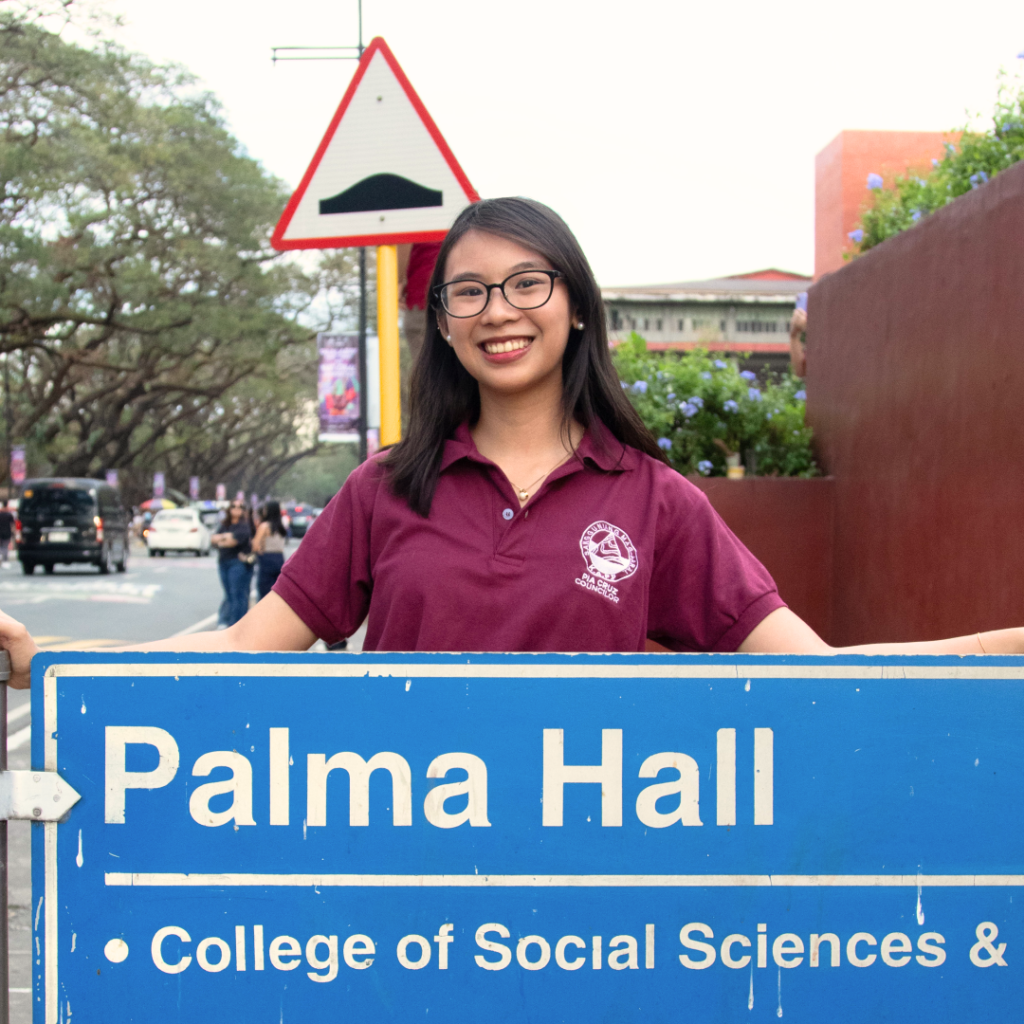
A Philosophy major may be proud to call Palma Hall their home college – after all, it’s one of the most iconic buildings in UP Diliman. Still, the most experienced of students know not to call it ‘Palma’ or ‘CSSP’. Even after almost 40 years since its name change, Palma Hall has always been known (and will always be known) as AS, short for its previous status as the College of Arts and Sciences. AS houses most of the General Education (GE) subjects, so it welcomes a diverse set of students everyday. Thus, the philo major’s journey is set against the backdrop of the hustle and bustle AS is known for. The day often starts with a short climb up AS steps, the famed site of choice for student mobilizations and mass actions. This leads them to the AS lobby, often filled with students rushing to their classes or hunkered over laptops.
GOOD MORNING! IT’S TIME FOR LECTURES.
Most philosophy classes are either held on the second or third floor of Palma Hall, or in the 2nd Pavillon – Pav 2 for short. Classes can begin as early as 7AM, unless CRS has blessed you with a more reasonable start at around 10AM. It’s prudent to have your morning coffee before class – the rigorous learning will begin whether or not you’ve had your dose of caffeine. Class sizes range from around 20-30 students, ensuring attentive instruction (so be sure you’ve done the assigned readings). Professors often structure lessons in line with Socratic tradition, so be ready to ponder hard on some mind-bending questions. No worries, the beauty of philosophy is that there are no wrong answers.
There is always something new to be learned (provided you don’t let your mind wander during class). Philosophy majors are introduced to key thinkers and controversies by taking Philo 1, Philo 108, and Philo 197 in their freshman year. This foundation will serve you well as you proceed to subjects in the history of philosophy, logic, ethics, metaphysics, and epistemology in your sophomore and junior years. As a senior, you’ll have access to higher majors that involve applied philosophy in the fields of law, bioethics, and other special topics. This is then capped off by defending your own undergraduate thesis. Don’t sweat it though – the curriculum is very diverse when it comes to philosophical learning. I personally had the best time in my Philosophy of Law (Philo 175), Social and Political Philosophy (Philo 176), and Ethics classes (Philo 171).
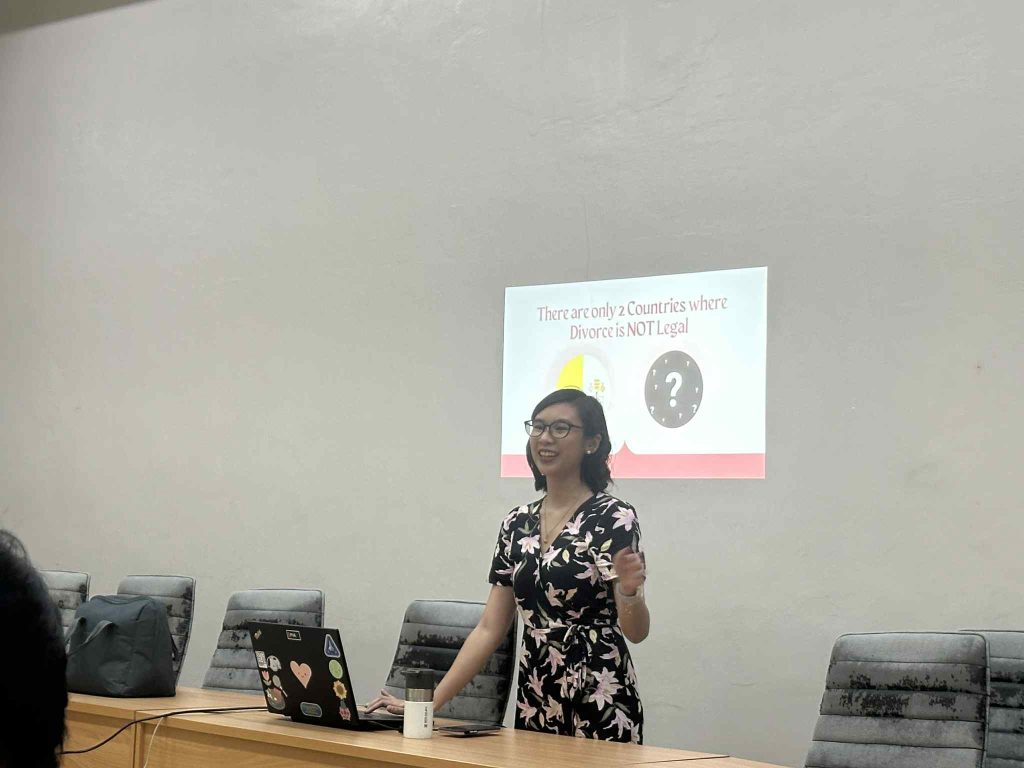
Pia’s Senior Thesis was a work in Philosophy of Law entitled “The Filipina’s Right to Un-Marry: Liberal Feminist Jurisprudence and Divorce Legislation in the Philippines”.
THAT WAS EXHAUSTING. ANYWAY, TIME FOR A BREAK!
There are many great food stops near AS to refuel after class. The kiosks behind Pav 2, near CAL, or on Fernandez street are favorites for many students for their delicious and affordable meals. You may also visit Antas, the convenience store on the 1st Floor of the West Wing of AS, to pick up packed lunches (and maybe a bluebook for your next exam).
Students have many spaces in AS to chill between classes. If you prefer quiet studying sessions, the AS Reading Hall just outside Pav 2 is perfect for you. For those seeking more active socializing, barkadas often find tables at AS Hill to enjoy their lunch and play card games. If you want a little bit of everything, across the street behind AS is Third Space at the Kamia dorm, where students can get home-cooked meals and hang out with their friends at group study sessions.
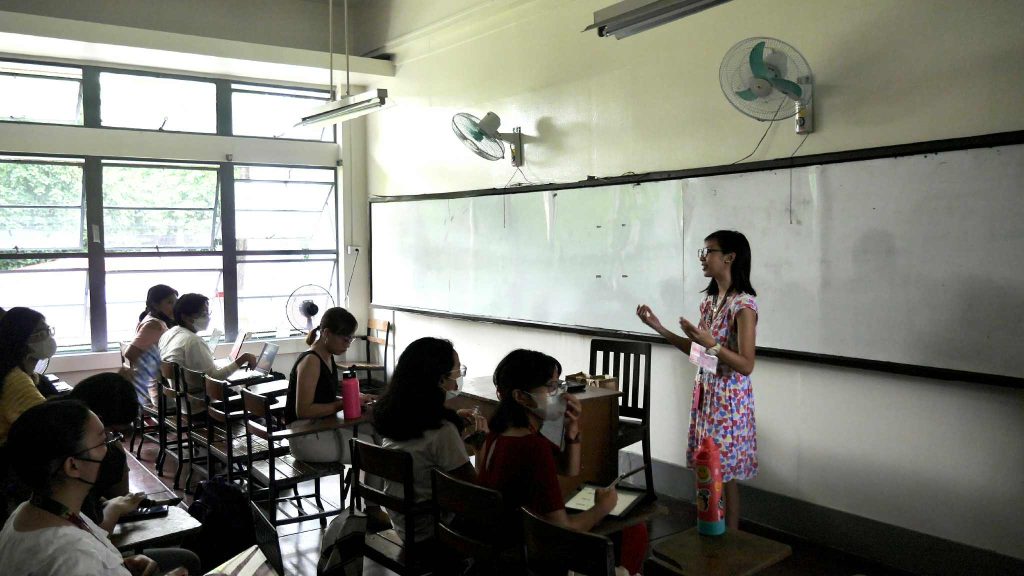
NO TIME FOR SIESTAS! MORE LEARNING INCOMING.
The learning continues after lunch, where afternoon classes begin at around 1PM. Our curriculum allows for cognate electives, which give majors the chance to explore other subjects beyond philosophy. While some opt for classes within CSSP like Political Science, Psychology, or Sociology, the options are practically limitless. You can explore your other interests by attending classes in Public Administration, Business and Economics, or Science and Math.
If you’d prefer some more hands-on learning, you can opt to apply for a post as a Student Assistant in the various offices around the university. Work usually involves publicity material making, event management, and other clerical tasks. Students earn up to PHP 81/hour to sweeten the deal.
WHAT’S BEYOND THE CLASSROOM?
Of course, a good philo major knows that learning occurs beyond the four walls of the classroom. There are many avenues for you to apply your philosophical learnings to concrete activities. One of the best ways to make friends and explore new passions is to join organizations. The Philosophy department is currently home to three student organizations: Apeiron Core Group, Kabataang Pilosopo Tasyo (KAPITAS), and UP Philosophy Society(PhiloSoc). There are also a variety of college-wide and university-wide formations you can join to champion your advocacies, try new things, and widen your horizons.
The department also greatly supports its undergraduates who intend to pursue careers in the academe. There is no shortage of conferences, symposiums, and research opportunities that students can take advantage of. The department often hosts its own functions, though students are always encouraged to participate in university-wide, external, and even international events.
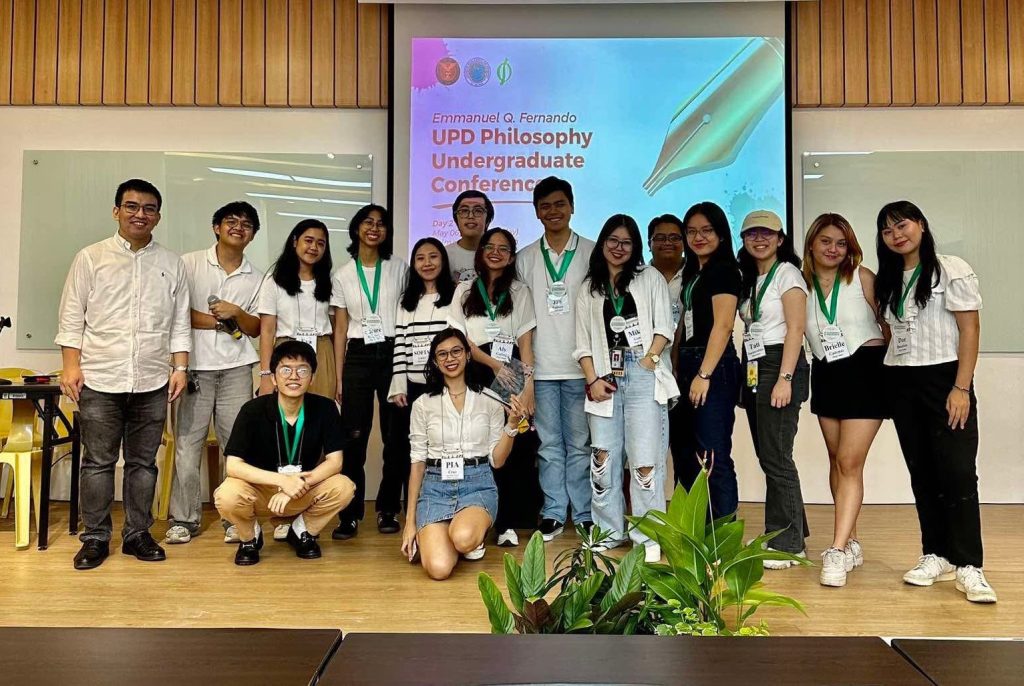
Pia was the Student Convenor and Head Organizer of the first ever Emmanuel Q. Fernando Philosophy Undergraduate Conference. Pia led an OrgComm comprised of 16 other philosophy majors along with Asst. Prof. Henry Fernando, Faculty Convenor.
Finally, for the more daring, there is always the calling to become a student leader in the department, college, or university. You may opt to become the Philosophy Department Representative, a Councilor, or even a Standard Bearer of the CSSP Student Council (CSSPSC). Beyond the college, you may even seek to serve as a member of the UPD University Student Council (UPD USC). I may be biased, as this was the path I chose, but student council is one of the most fulfilling involvements. It connects you with your fellow students, but also allows you to befriend other sectoral members like the faculty, staff, maninindas, and security guards of the college. Student leadership enables you to harness your brand of philosophical rigor towards the service of the broader UP community.
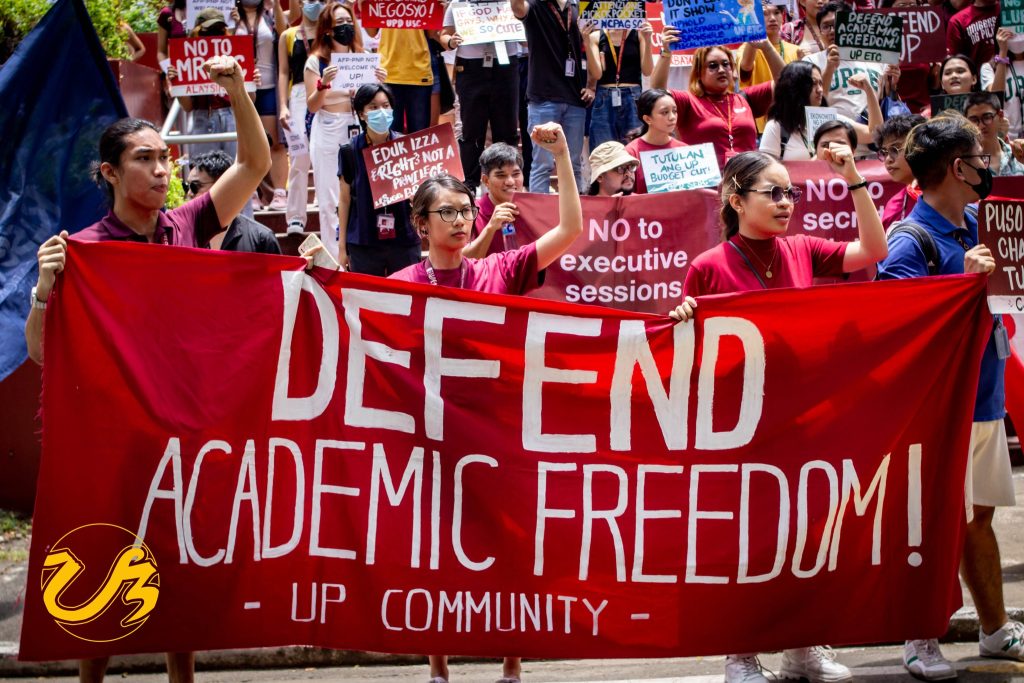
The life of a philosophy major is truly an exercise in free will. You are encouraged to choose the classes that spark your interest, explore the variety of character-building opportunities, and gain lifelong core memories. At the end of the day, your journey as a philosophy major is what you make of it – all in the palm of your hand.
ABOUT THE AUTHOR
Pia is a graduating BA Philosophy undergraduate senior who is currently in the running for Summa Cum Laude. She also served as CSSP Representative to the USC from 2024-2025.
